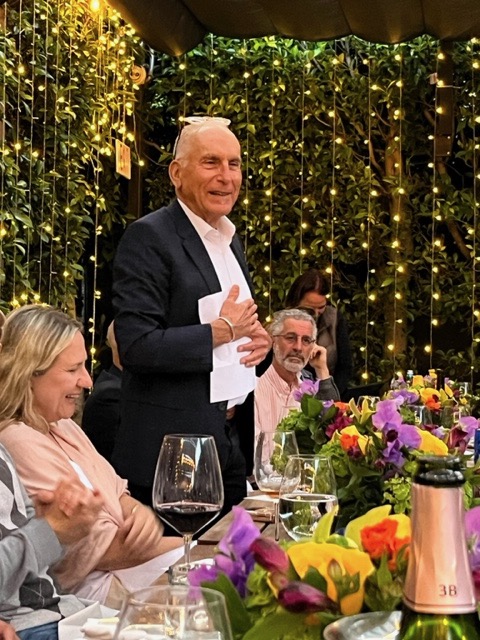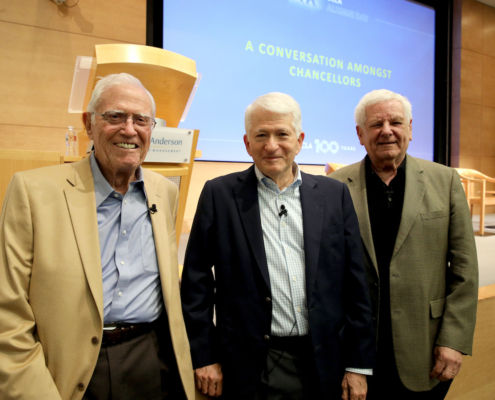By Mary Braswell
“People out there expect you to fail. Prove the haters wrong. You know I’m here for you always.”
These words from a father to his young daughter — consistently encouraging her to finish school, stay away from drugs and make a good name for herself — helped her rise above the damaging stereotypes she faced as a Black girl growing up in America.
The New Jersey teen’s story was one of many shared by Yale University scholar Ijeoma Opara, who came to UCLA on Oct. 19 to deliver her message that harnessing the inner strengths of children of color is not just possible but imperative.
Opara, the first UCLA Luskin Lecturer of the 2023-24 academic year, conducts research focused on the well-being of Black girls, who may face multiple layers of stress because of their race, gender, class and age.
The conversation between father and daughter emerged in a survey Opara led of 200 girls from around the country, most in their mid-teens. With surprising frankness, they spoke of how they view themselves in the world, and how they struggle to protect their health and mental health in the face of harmful stereotypes.
“They were very aware that they were not loved by society,” said Opara, who directs the Substance Abuse and Sexual Health Lab at Yale.
“They understood, too, that society always assumed they were doing something bad. … They’re internalizing all the things that adults are saying about them, all the images they’re seeing.”
Some of the girls wondered how they could possibly thrive in a world that assumed they were angry, aggressive, into drugs and alcohol, or sexually permissive.
‘It’s not about us saving these children, right? They don’t necessarily need to be saved. They need to be empowered.’ — Ijeoma Opara of Yale University
“We cannot keep looking at Black children as if they are criminals instead of harnessing their strengths,” Opara said.
“It’s not about us saving these children, right? They don’t necessarily need to be saved. They need to be empowered.”
Opara was moved to study the unique experience of Black girls in high-risk surroundings because, she says, “I was one of them.”
Growing up in a part of New Jersey where violence and drug use were common, she saw many friends choose unhealthy paths. Later, as a social worker in New York City helping youths caught up in the criminal justice system, she came face to face with Black girls who had simply given up hope.
But she wondered, “What about girls like me and the other girls that I run into who are thriving in these environments? Why aren’t we talking about them, learning from them?”
On her academic journey, as she earned a PhD as well as master’s degrees in social welfare and public health, Opara set out to connect with these girls. She wanted to hear what factors led to their strong self-esteem and how their experiences could help others.
The common denominators, her research has found, include a strong sense of ethnic pride, a community that has their back and the belief that they have some control over their destinies.
Among girls who demonstrate a high level of resilience and self-assurance, the public health ramifications are striking, she said, with many far better equipped to avoid substance abuse and sexually transmitted infections.
For those who’ve already fallen into dangerous behaviors, these strategies can still provide a lifeline. Opara shared the story of Sheila, who by age 15 had been involved with robberies, attempted murder and kidnapping. Sheila had spent time on Rikers Island.
“She had no hope in the future. She thought she would be dead by 19 years old,” said Opara, who was assigned to Sheila’s case when she was a social worker.
With Opara’s help, Sheila came to “feel heard, feel like a teenager, feel like a human” and eventually turned her life around. She is now attending graduate school and volunteering as a youth advocate for a substance use prevention program.
“Sheila is the reason that I do the work that I do,” Opara said.
In her current research, Opara’s top priority is elevating the voices of young people of color. She has opened up opportunities for Black girls by offering internships in her lab and hosting tours of Yale to show that higher education is within their reach.
Her signature Dreamer Girls Project is a “safe space for Black girls that infuses elements of ethnic identity, of empowerment, of pride, of sisterhood,” Opara said, and its youth advisory board, a small working group of budding researchers, helps shape and administer her studies.
During her visit to UCLA, Opara met one-on-one with UCLA Luskin doctoral students and appeared at a virtual meeting of the Los Angeles County Commission on HIV’s Black Caucus. The commission was a co-sponsor of the visit, along with the UCLA California HIV/AIDS Policy Research Center and the Center for HIV Identification, Prevention and Treatment Services at UCLA.
Following Opara’s Luskin Lecture at UCLA’s California NanoSystems Institute, Ayako Miyashita Ochoa of the UCLA Luskin Social Welfare faculty moderated a conversation that delved into the most effective ways to strengthen connections among social workers in the field, the research community and those in position to make real policy reforms.
Opara said the guiding principle is keeping the focus on the strengths of children instead of their deficits.
“It’s up to us as adult allies to support them, to show them that they that if they fail, if they make a mistake, we’ll be right there, judgment-free, to support them and lift them up.”




